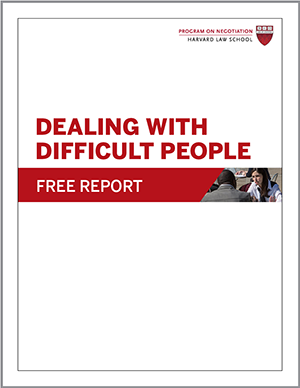
Miscommunication often leads to impasse in negotiation. When we don’t understand what the other party wants, we can grow frustrated by their perceived lack of cooperation with our own wishes and give up prematurely on reaching agreement. Miscommunication also can be a problem when we are consulting advisers for help with an upcoming negotiation, whether formally or informally. Two recent studies examine common negotiation mistakes that can lead to communication breakdowns and offer ideas for avoiding such pitfalls.
How Anger Hinders Perspective Taking in Negotiation
The ability to take another person’s perspective is a valuable negotiation skill. Perspective taking enhances the discovery of joint gains in negotiation, makes groups more effective, reduces stereotypical thinking, and aids in conflict resolution, to name just a few benefits.
Some people are naturally better perspective takers than others, but all of us have the capacity to pay closer attention to how things look from someone else’s point of view. However, certain scenarios and emotional states can make this difficult and lead to communication breakdowns. Time pressure and demands on our attention hinder our perspective-taking ability, as does power: Generally, powerful people give less thought to how others view a situation, often because they don’t think they need to.
Particular emotions can also impede perspective taking. When we’re feeling happy, we’re not as good at making inferences about others’ perspectives because happiness promotes superficial information processing. People who are feeling anxious also are less attuned to others.
Anger also impairs perspective taking, researchers Jeremy A. Yip (Georgetown University) and Maurice E. Schweitzer (University of Pennsylvania) found in a 2019 study. Anger puts us in a state of high arousal—the physiological state of being energized and stimulated—which promotes self-centered thinking and self-interested behavior. In some of Yip and Schweitzer’s experiments, participants who were induced to feel angry were less skilled at perspective taking in a subsequent, unrelated task than participants who were instead induced to feel sad, disgusted, or neutral.
In another experiment, anger triggered by a task also reduced participants’ perspective-taking ability when performing that task. However, those who were asked to label how they felt—such as angry—were just as skilled perspective takers as those in a neutral state. This result suggests that taking note of when we feel angry can help us avoid the egocentric bias that hinders perspective taking and thus triggers communication breakdowns. On the flip side, recognizing that an angry negotiating counterpart may be more self-centered than they usually are can keep us from overreacting and escalating conflict.
Whether you feel angry during a negotiation or the other party is losing their cool, call for a break and then try to calmly discuss the tension that filled the room. In the process, you are likely to experience the type of perspective taking that prompts creative thinking and mutually beneficial solutions.
Keeping Advisers on Our Side
Seeking advice from others is a wise and common step to take before any important negotiation. We often can gain valuable information about whom to approach, what to offer, what to accept, and how to navigate an unfamiliar negotiation process from trusted advisers. Whether our negotiation adviser is an experienced lawyer negotiating on our behalf or a friend sharing their personal experience with a similar situation, we weigh their advice and decide whether or not to follow it.
Unfortunately, when we reject someone’s advice, we may suffer a backlash, researcher Hayley Blunden (American University) and her team found in a 2019 study. In their experiments, advisers—especially expert advisers—tended to view people who didn’t take their advice as less competent than those who did take their advice. As a result, from then on, the advisers were less willing to work with those advice seekers who ignored their counsel. And, ironically, while soliciting advice from multiple experts is a proven strategy in negotiation and other realms, advisers tend to react more negatively to those who seek advice from multiple advisers than to those who consult only one adviser (that is, themselves).
Advisers’ negative reactions stem from the fact that they significantly overestimate the degree to which others will follow their advice, the researchers found. Why? Advisers mistakenly tend to assume that advisees view them as uniquely qualified to provide guidance on the issue at hand. In fact, people ideally try to gather as much information as possible before making an informed decision—a strategy that can lead to a lot of rejected advice.
How can we maintain good relationships with negotiation advisers whose advice we don’t take? Blunden and her colleagues recommend explicitly discussing our goals before seeking advisers’ counsel—for example, “I want to explore all of my options, so I’m soliciting opinions from people in lots of different spheres.” Doing so can manage their expectations and avoid communication breakdowns.
What experiences have you had with communication breakdowns in negotiation?




